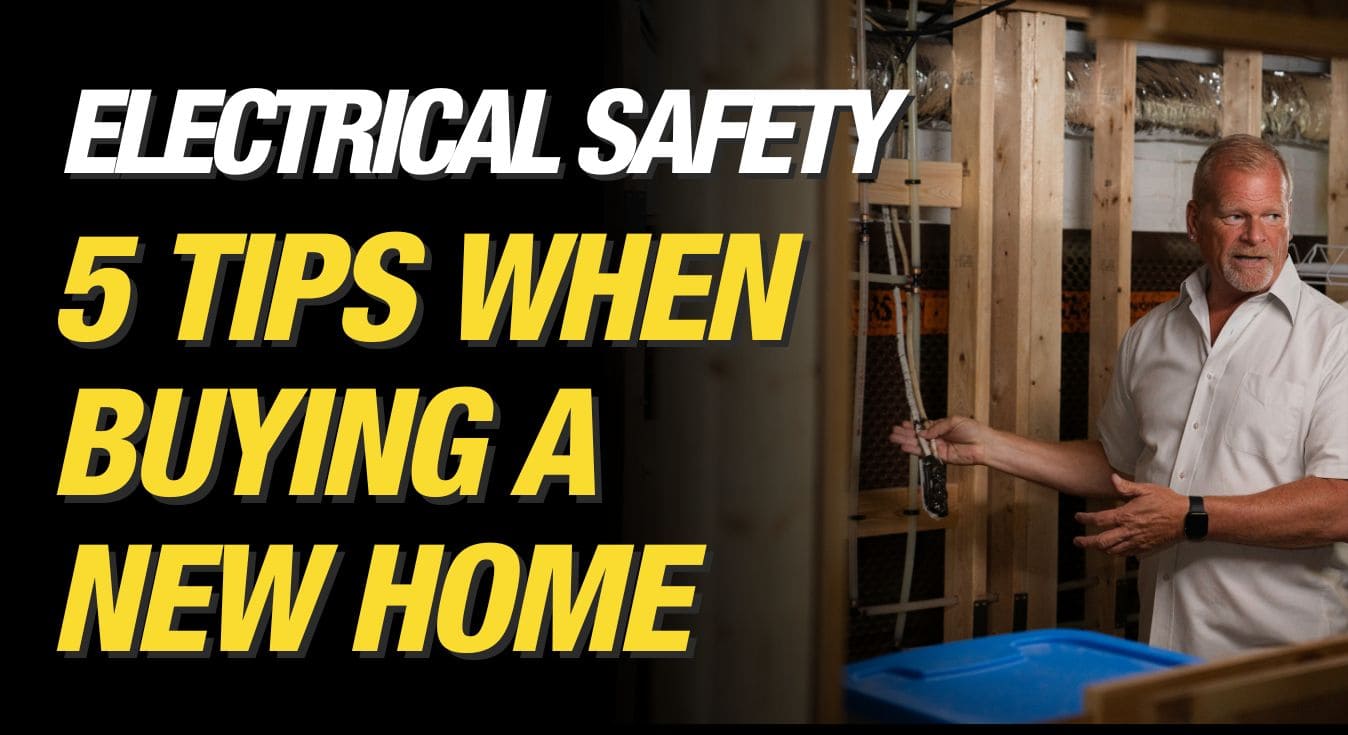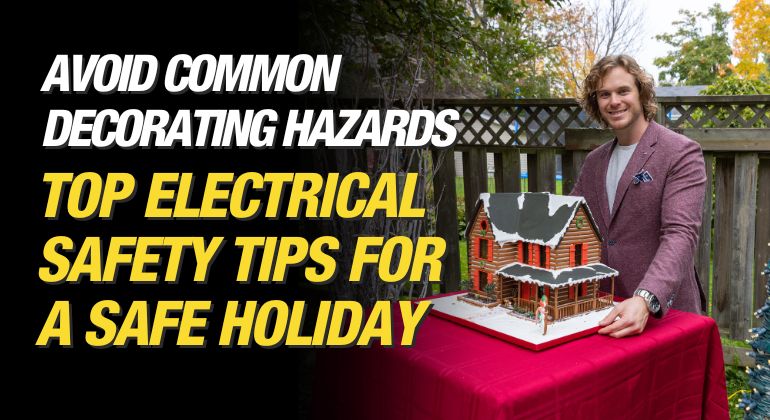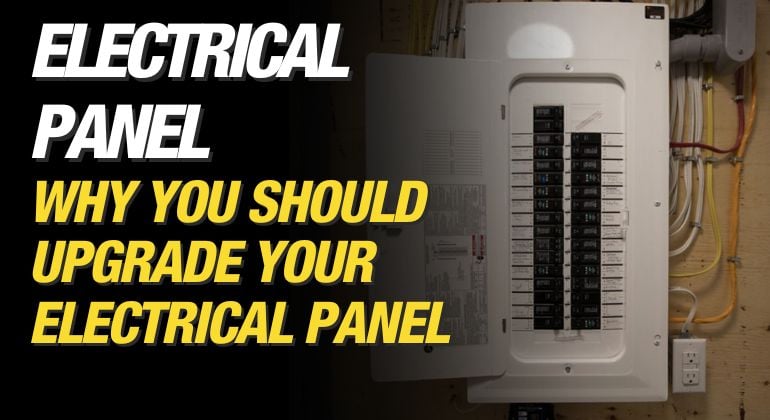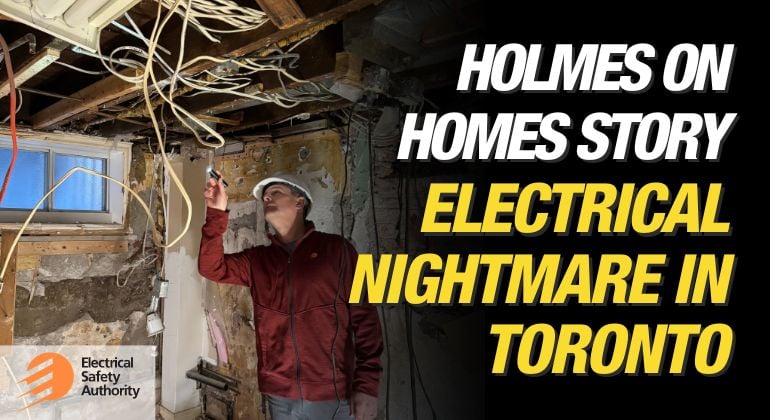I love exploring new technology—especially when it genuinely improves how we work in construction—and I recently came across one that truly impressed me, iGUIDE by Planitar Inc. In my...
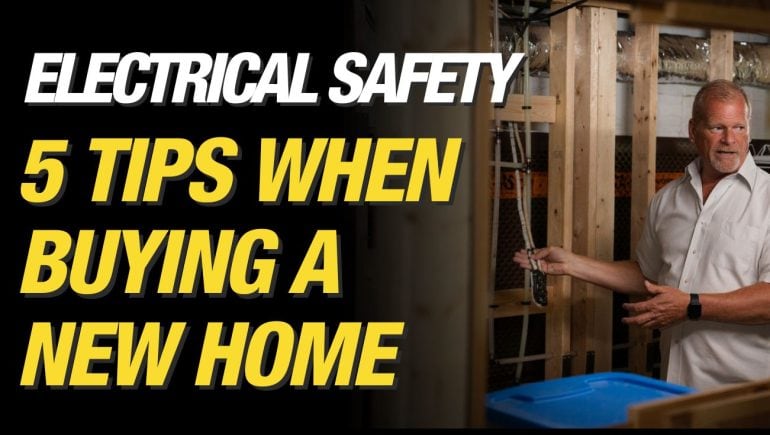
5 Electrical Safety Tips When Buying A New Home
By Sherry Holmes
Mike’s Advice / Buying & Selling Your Home
Thursday, July 18th, 2024 @ 2:43pm
Electrical Considerations When Buying A Home
My Dad’s best advice for new homebuyers is to always have an excellent real estate agent and home inspector lined up before purchasing a new home. Ensure they are seasoned and knowledgeable in the type of home you are looking for and familiar with the area you want to live in. If possible, he even goes so far as to suggest home buyers request an electrical inspection, especially if the potential home is an older one. It’s crucial to keep in mind electrical safety when buying a new home.
This is sound advice because the one thing I’ve learned from working with my dad is that almost every home we’ve worked on has had some questionable electrical work done. I know this is not always possible as a pre-purchase condition and may be difficult but it is important.
Here are some electrical tips to help ensure the home is safe:
#1 Don’t be Afraid to Ask Your Realtor For The Right Paperwork
As we all know, purchasing a home will likely be the largest purchase you will ever make. It’s a stressful and scary process. You want the house to be the right choice for you and your family.

Home built by Holmes Approved Homes Builder, Rinaldi Homes.
Your realtor should have your back and be there to help you through the entire process. But it never hurts for potential homeowners and new homeowners educate themselves on every aspect of homeownership. This includes electrical safety. Real estate agents should also be doing some additional homework for their clients because it’s in their best interest to find a home that is in good condition and safe for you and your family.
For example, if the home you are considering has been “newly renovated” or has “upgrades,” like new lighting, check with your real estate agent to ensure that:
- The electrical work was done by a LEC (Licensed Electrical Contractor)
- Check with your local provincial electrical authority that a notification (i.e. permit) was applied.
- And ensure the work has been reviewed and passed by the local electrical authority and you get a certificate of acceptance for the work done
Here’s a real story of someone who used to work with our team, and thought she didn’t need an electrical inspection. However, once she took ownership of the house little did she know there was a whole set of problems waiting for her.
Buyers and Seller Do This to Protect Yourself and Your Home:
- At minimum get a quick Test & Trouble-Shoot Test by a Licensed Electrical Contractor: involves looking at the panel and checking plugs and receptacles. Approximately $600.00
-
Recommended. Do a more thorough Test & Trouble-Shoot Test by a Licensed Electrical Contractor: involves looking at the panel, each device and opening up the walls to look at the wiring. In some cases, device upgrades will be necessary, Approximately 6-8 hrs of work and $2,000.00, and yes, there will be some damage to the walls that will need to be repaired. However, option #1 will give you a good idea of what will be required to get your home up to code.
Here are some extra tips I’ve learned from my friend Frank, a licensed electrical contractor, who you’ve seen on many of my shows, that you and your realtor should look for when buying a home.
#2 Look into Recent Renovations or Upgrades
If you notice the house has been newly renovated, make sure to cross-reference any recent work with renovations done. You can do this by contacting the local building department to find out if any recent or outstanding permits have been issued to the address or location of the house with other permits, like HVAC, plumbing and electrical.
If you have any specific electrical concerns, consider getting your real estate agent to prepare a real estate transaction closing documentation with a clause stipulating that the sale goes through pending verification from your local electrical authority that electrical notifications or permits were taken and closed as part of any recent renovations.
I appreciate this may be a challenging decision, especially in the current housing market. However, in all real estate investments, you need to consider the amount of risk you are willing to take.
Electricity when not handled correctly can be very dangerous. Unlicensed electrical work can lead to shock, fire and potential death. In some circumstances, your insurance can be affected or cancelled. It makes sense to take the necessary steps to ensure the work has been done correctly, reviewed by the local electrical authority, and to code. This is especially true if you are purchasing an older home.
RELATED
Did You Know?
Nearly all electrical work needs to be done by a licensed electrical contractor? Most provinces and territories have their own provincial electrical authority that oversees electrical work done in homes – this includes permitting, inspections, and licensing related to electrical work. It’s important for homeowners to understand the risks of not getting the proper permits, and inspections – to be safe the job needs to be done right and to current codes. It’s essential to understand that open work refers to work that is still in “progress” and has not been “inspected and closed”. If that is the case, the new homeowners – that’s you – will be responsible for fixing any electrical defects that may exist.
#3 Ensure a Licensed Electrician Did the Work
In most areas, only licensed electricians can be hired to do electrical work in a home.
Also, be sure to your licensed electrical contractor is insured, has WSIB, and is qualified to do electrical work in your province or state.
General contractors and handypersons are NOT legally qualified or licensed to do electrical work, however check with your local municipality for current regulations.
“Master Electricians” and “Certified Electricians” may work for a Licensed Electrical Contracting business. They can only be hired directly to do electrical work if they are properly registered. Bottom line any licensed electrician that works on your home in Ontario or any province/territory needs to be certified, licensed and insured to work in that province.
Did you know?
Tamper-resistant receptacles are required everywhere inside and outside a home, excluding accessory buildings like garages and tool sheds. These receptacles protect everyone, but particularly young children, from electrical shock if fingers or objects are inserted into the outlets.
#4 For Any Electrical Work, Even Conditional, Ensure an Notification of Work is Filed
Before any work begins, verify the notification of work is included in the LEC’s estimate to avoid surprises. Filing a notification of work with the local electrical authority is the only way to ensure the electrical work has been reviewed and safe.
Homeowner Tip: In Ontario, homeowners ARE allowed to do electrical work on their own house. BUT I don’t recommend it. Always trust a professional, it’s about safety and keeping you and your family safe.
We come across dangerous electrical work a lot. We even found a live wire behind a shower recently. Don’t take chances! Remember, electrical work still needs to be reviewed by the local electrical safety board, even if you decide to do it yourself. In most cases, you will need a notification of work to be filed BEFORE the work starts or within 48 hours after work has started.
RELATED
#5 Always Ask about Permits and Be Wary of DIY Electrical Work
Even if the homeowner decides to do some minor electrical work, like replacing a few regular receptacles with smart receptacles you still need to apply for a notification of work with the local electrical authority. You must verify with the them that completed and future work is registered.
Other Electrical Things to Look Out for When Viewing a Potential New Home:
Many electrical concerns are “hidden” behind the walls and not visible. However, there are some signs that homeowners and potential homeowners can look out for.
Remember you can never ask too many questions.
Look for these things when you are viewing any potential homes:
- Do you smell a burning smell when you turn on a light or use a plug?
- Do you notice flickering lights?
- Do you notice discoloured wall outlets (light brown or black marks)?
- Do you notice outlets and light switches that are warm or hot to the touch?
- Do you notice two-pronged outlets instead of three-pronged outlets?
- Do you see old fuses in the electrical panel?
- Do you see a combination of both breakers and fuses?
- Do you hear a buzzing sound from a light fixture?
- Does the electrical panel look messy with lots of wires?
- Do you notice sparking when you remove a cord from an outlet?
- Do you notice any updated outlets, particularly in the kitchen and bathrooms?
NOTE: GFCIS are circuit interrupters that provide an extra layer of protection where electrical circuits may accidentally come into contact with water. They are typically found in kitchens, bathrooms and laundry rooms, and even garages. They typically have two small buttons at the center. This would indicate that there have been upgrades, so ask about the notification of work.
Check out House Buying Red Flags – Red Flags to Avoid When Buying a Home
There will always be an element of the unknown when you purchase a home. However, the more research and questions you ask the better the outcome. The next time you are looking for a new house, don’t forget about electrical safety. Remember these tips when viewing a home. Using them will provide a deeper understanding of the potential home’s needs. This will also help ensure your new home has minimal surprises. Happy house hunting!
READ MORE
7 Interior Design Renovation Tips from Our Show
